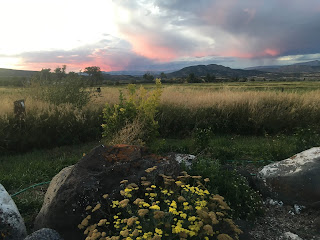One of my favorite TED talks is this one that describes
the language of experience. In it, Poet Ali, very effectively describes the language of a fat kid, the language of watching a loved one battle cancer, the language of 9/11/2001, and the language of being a minority.
There are some experiences that are impossible to truly understand unless you've also had that experience.
Do you speak this language?
You get a phone call and your life will never be the same. Someone you love, someone full of life, someone who was just laughing with you, someone who is much too young, is no longer alive. It seems impossible that the world is still operating as though nothing happened, that people are still talking about trivial matters, that life is going on for the rest of us.
When my brother, Chris, died in a car accident in 1997, someone told me I'd joined "the death club." It's a club that understands deep grief. You exit the innocent world in which we all are going to live very long, healthy, happy lives, to one in which we realize that we all could die at any moment. We face our own mortality and the mortality of everyone we love. We experience a grief so deep that we don't think we can ever be happy again.
Time goes on and we are happy again, but not in the same way. We don't take life for granted. When there is a death, we have more compassion than we once had. We understand the "language of grief." We question, more than ever, the meaning of life. We want, more than ever, to spend our precious time wisely.
My friend, Rebecca, is one who also understands grief. She used to have a Website, "Altared Spaces," in which she described sacred spaces that we make to bring comfort and joy to ourselves or to others.
About ten years ago, Rebecca and I spoke often, and we talked about visiting roadside altars.. we knew that the families who created the memorials were others who understood and spoke the language of deep grief.
This year, when I put together my list of 60 goals I knew I wanted to finally fulfill that goal of visiting those altars. Number 37 from
my list of 60 was:
Do a roadside altar road trip with Rebecca M.
What better time to do the trip than Chris's birthday, September 28th? Rebecca, who lives in Mesa, Colorado, had already scouted out several roadside memorials. We made plans to meet, visit the roadside altars, and then go on to Moab, Utah, to hike in beautiful Arches National Park.
Rebecca was an awesome hostess throughout this memorable weekend. She is a friend that not only understands the language of deep grief, but the language of deep friendship.
I was so touched at the end of the day, after a delicious dinner that she'd prepared, Rebecca read out loud the book, "On the Day You Were Born" in Chris's honor.
Gazing out at the beautiful surroundings, remembering Chris, feeling the loving generosity from my friend, feeling empathy for the families of those who grieve.. all of these fill me with emotions that bring tears to my eyes.
I was at a memorial service recently for a man I used to work with. His son-in-law said he'd heard this quote about grief:
Grief is like glitter; No matter how much you try and tidy it up you’re never going to get rid of it all. You’re always going to find bits of it.
When grief is new, it's hard to find anything 'sparkly' about it. But now, when I think of Chris, or the other people I've lost, they are sparkly like glitter, reminding me to love deeply and live fully. It might seem cliche, but when you speak the language of deep grief, you understand.























































